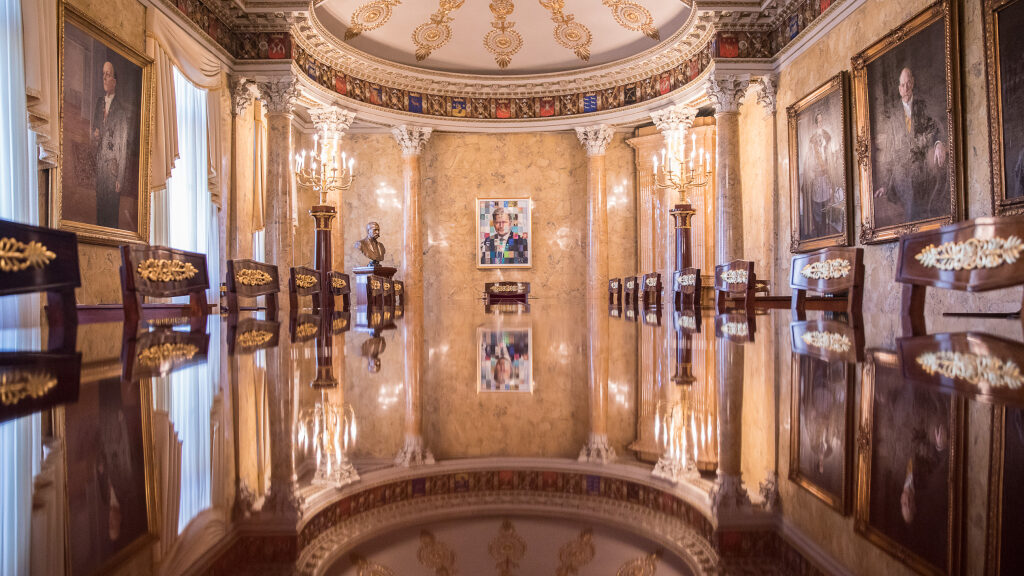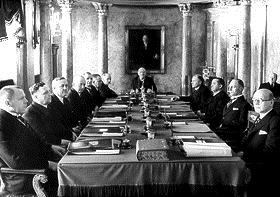
Presidential sessions of the Government
The President makes all formal decisions in the Presidential sessions of the Government, generally held at 11.00 on Fridays. Decisions made in a Presidential session are recorded in the relevant official document (Act, Decree, open letter, letter of appointment, etc.) signed by the President and counter-signed by the Minister presenting the matter. The Government implements the President’s decisions. The decisions are announced on the Government website.
The President makes decisions in Government sessions and on recommendation by the Government. If the President decides not to decide a matter according to the Government recommendation, the matter will be returned to the Government for re-preparation. In such a case, if the matter does not involve confirming legislation, an official appointment or an official assignment, the Government may simply submit a report to Parliament, following which the matter will be resolved according to the opinion returned by Parliament on the report, if the Government chooses to recommend it.
However, the following decisions are made by the President without reference to a recommendation from the Government:
- appointing and dismissing the Government or one or more of its ministers,
- ordering premature parliamentary elections,
- pardons and any other statutory matters that concern private individuals and which by their nature do not require a full Government session,
- matters specified in the Åland Autonomy Act apart from those related to the finances of the province, and
- military command matters resolved in a Government session, and matters concerning the Office of the President of the Republic.
The relevant Minister presents each recommendation for the President’s decision. However, a proposal for a Government reorganisation involving the entire Government is presented by the relevant Government rapporteur.
Presidential decisions must be prepared at the relevant ministry before being presented to the President. When the President makes decisions in a Government session, at least five ministers must participate in the process, and the Chancellor of Justice must be present. The Presidential sessions of the Government are the principal vehicle for formal decisions made by the President. The only exceptions to this are in-camera presentations and de facto decision-making during initiation and preparation of a matter.
In-camera presentation
Military command matters and military appointments are decided by the President on presentation by the Chief of Defence, or the Minister of the Interior concerning the Border Guard, generally in an in-camera presentation without the Government’s contribution.

The President decides on military matters on the recommendation of the Chief of Defence together with the Prime Minister and the Minister of Defence, generally in an in-camera presentation outside regular Government meetings. The Minister of Defence must be present and the Prime Minister may be present and is entitled to speak at such a presentation. The President may refer a matter presented in camera for decision by the Government at his or her own initiative or on submission by the Minister of Defence; in such a case, the matter will be presented to the Government by the Minister of Defence. In this case, the President’s decision in the Government session is made without a Government recommendation. In case such a matter is being decided in a Presidential session of Government, the Chief of Defence is entitled to be present and to speak.
The President decides on military appointments based on an in-camera presentation by the Chief of Defence, with the contribution of the Minister of Defence. The Minister of Defence may be present and is entitled to speak at such a presentation. Any appointments not specifically meant to be decided in a Government session are decided at an in-camera presentation, including appointments and assignments of officers of the rank of Colonel or below.
The President decides on military command matters regarding the Border Guard on presentation by the Minister of the Interior outside Government sessions. These decisions are confirmed by the Minister of the Interior. The Prime Minister is entitled to be present and to voice on opinion when such matters are presented. The appointments and assignments of officers of the rank of Colonel and below are decided at an in-camera presentation, while appointments to the positions or ranks of commanding officers, Chief of the Border Guard and Deputy Chief of the Border Guard are made by the President in a Government session on recommendation by the Government as presented by the Minister of Defence. The President may refer a military command matter presented in camera for decision by the Government at his or her own initiative or on submission by the Minister of the Interior; in such a case, the matter will be presented to the Government by the Minister of the Interior. In this case, the President’s decision in the Government session is made without a Government recommendation.
Other decisions
The President’s de facto decision-making in the initiation and preparation of matters also depends on the Government’s contribution but is conducted informally if such a decision is not a significant foreign policy decision or action (a speech, a letter or an invitation sent or received). The Government may contribute to the President’s foreign policy decisions and actions not decided on in Presidential sessions of the Government for instance in the Foreign and Security Policy Committee or in informal talks with the Prime Minister and/or one or more other ministers.
In matters of widespread or profound import, this contribution may require discussions with the entire Government, but generally it is enough for the Cabinet Committee on Foreign and Security Policy and the President to have a meeting or for the President to liaise with the Prime Minister and/or the relevant minister, in most cases the Minister for Foreign Affairs. This is the procedure with which the President decides on state visits and official visits abroad and on invitations to foreign heads of state to visit Finland.
Speeches and public appearances
The President’s public appearances include speeches, statements, greetings, interviews and press conferences. The President also makes other public appearances at functions and on occasions considered relevant and necessary for the discharging of the duties of the President. The President honours various celebrations and events with his or her presence.
When the President makes an official visit abroad or a foreign head of state visits Finland, the President generally makes one or more speeches. The President also usually meets representatives of the media in connection with visits and trips.
The President gives dozens of speeches at various occasions each year; the speeches are available on this website. Annual events include the President’s New Year’s Speech and the speeches at the opening and closing of Parliament sessions.
New Year’s Speech
The President gives the New Year’s Speech on New Year’s Day, 1 January. The first such speech was given by President P.E. Svinhufvud on the radio in 1935. The first televised New Year’s Speech was given by President Urho Kekkonen in 1958. In 1993, Prime Minister Esko Aho gave the New Year’s Speech, standing in for President Mauno Koivisto.
Speeches at the opening and closing of Parliament sessions
The Constitution requires the President to declare the annual sessions of Parliament open and closed at the formal ceremonies held for the occasion.
The ceremonies begin with a service at Helsinki Cathedral, after which the President and Members of Parliament go to Parliament House. At the opening of Parliament, the President speaks first and the Speaker replies; at the closing, the order is reversed.
Other annual speeches
Since 1950, the President has given the opening speech of the annual Common Responsibility fundraising drive of the Evangelical-Lutheran Church of Finland, originally on radio and more recently on TV. This usually takes place on the first Sunday in February.
From 1945 to 2005, the President also formally announced the celebration of War Invalids’ Week and the Autumn Collection for War Invalids, originally on radio and more recently on TV. After 2005, the Autumn Collection was discontinued.
Discharging the office of President
The President is available for performing official duties at all times. There are no specified working hours or annual leave.
Incapacity and substitution
If the President is unable to perform official duties, these will be taken over by the Prime Minister or, if the Prime Minister also is unavailable, the minister who is the Deputy Prime Minister.
The longest periods of substitution to date have been due to illness (1927, 1940, 1945–1946 and 1981–1982). Before 1991, most substitutions were effected because it was considered that the President was unavailable to perform his duties if he was travelling abroad. This practice was abandoned at the beginning of 1992.
The President may not delegate the duties of the office of President to anyone else, except for the function of Supreme Commander of the Defence Forces, which the President may, on submission by the Government and under exceptional circumstances, delegate to another Finnish citizen; and the formal opening and closing of the Åland Assembly, which may be performed on the President’s behalf by the Governor of Åland.